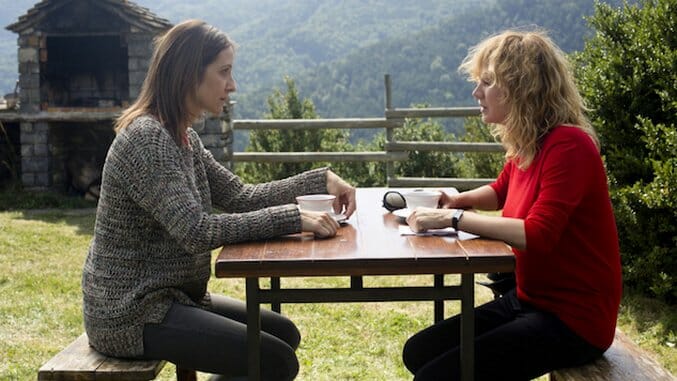Julieta

Rebounding from the disastrous I’m So Excited, writer-director Pedro Almodóvar is relatively subdued by his boisterous standards with Julieta, an absorbing melodrama that could almost be called All About Your Mother. The tale of a matriarch trying to explain to her long-lost daughter how she was conceived and why a chasm grew between them, Julieta weaves together sex, intrigue and regret with typical Almodóvar-ian flair. But there’s also a gentleness to the proceedings that’s especially tender. It’s a minor work from a major filmmaker that’s properly scaled in its modest heartbreak and insights.
As the story begins, middle-aged Julieta (Emma Suárez) is preparing to leave Madrid for Portugal so she can be with her new boyfriend Lorenzo (Darío Grandinetti), happy to start a new life. But while finishing up packing her place, she encounters Beatriz (Michelle Jenner), who was best friends with her daughter Antía when they were girls. Shocked to see Beatriz, Julieta is even more disoriented when the younger woman casually mentions that she ran into Antía, whom Julieta hasn’t seen for more than a decade. Impulsively, Julieta decides that she can’t move to Portugal: If there’s a chance to track down her daughter, she has to take it.
Julieta is the story of why mother and daughter stopped speaking, and it’s told through a long letter that Julieta writes to Antía in a journal. The older woman’s writing is shown through flashbacks as we meet a younger Julieta (now played by Adriana Ugarte) as she goes on a train trip, falling in love with a warm, handsome fellow passenger named Xoan (Daniel Grao). The man has a wife, although she’s been in a coma for several years, and after an accident forces the train to stop suddenly, Julieta and Xoan feel drawn to one another, their passion quickly turning to lovemaking.
Based on three interconnected short stories from Alice Munro’s 2004 collection Runaway, Julieta doesn’t have much new to say about intergenerational tensions and how tragedies can reroute lives. But as Julieta narrates her life, in which a happy marriage gives way to unrest, Almodóvar begins to examine the very exercise of telling one’s own story. Julieta fills in her absent daughter on the plot details she missed because she was too young or not yet born, but the older woman is also trying to attach meaning to an existence that, like so many, has hardly run smooth. Part apology, part justification, part rationalization, Julieta’s tale ultimately plays like an extended reintroduction to Antía, whom Julieta hopes may finally be willing to reconnect with her.
-

-

-

-

-

-

-

-

-

-

-

-

-

-

-

-

-

-

-

-

-

-

-

-

-

-

-

-

-

-

-

-

-

-

-

-

-

-

-

-








































